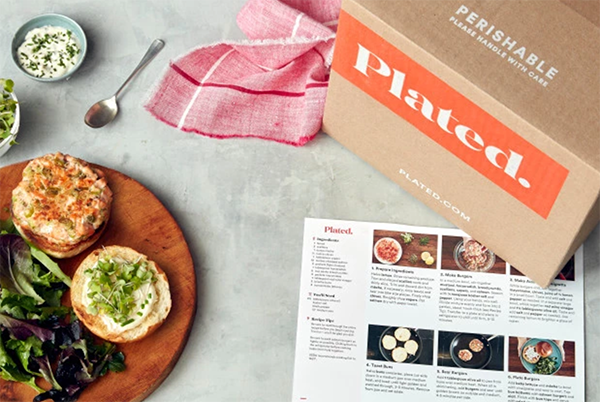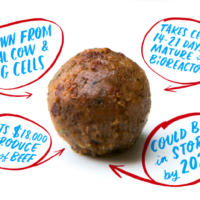
Every week we track the business, tech and investment trends in CPG, retail, restaurants, agriculture, cooking and health, so you don’t have to. Here are some of this week’s top headlines.
The retail space is making waves this week, and it’s looking a little dicey for emerging food brands. Whole Foods announced that starting in April brand representatives will no longer be able to promote products in store. Instead, Whole Foods will offer a paid brand advocacy program. The retailer is also centralizing product sourcing, though it says it will continue to sell local brands. Aldi announced it’s investing $3.4 billion to double its U.S. presence. Its expansion strategy includes significantly cutting its product offerings, so it can reduce operational costs and offer consumers rock-bottom prices. Albertsons acquired meal-kit company Plated for $200 million, though the final price could end up double that amount as the supermarket chain has agreed to “earnout” payments based on how Plated grows. Collaborative Fund’s Sophie Bakalar wrote a great post about why brands need a multichannel strategy.
In CPG news, Hampton Creek has bounced back from the days of its empty boardroom with an impressive new board of directors and a patent for its machine learning-based analysis of plant parts for potential products. In hopes of cutting waste of packaged goods, the Consumer Goods Forum have launched an initiative to harmonize “use by” labels around the globe. Amidst obesity and health problems in Brazil, the New York Times published expose examines Nestlé’s sales tactics in Brazil.
AgFunder released its midyear investing report, revealing that early stage investment in agrifood tech startups reached $4.4 billion in the first half of 2017, posting a 6 percent year-over-year increase.
Finally, S2G Ventures has closed a $180 million fund to invest in food startups.
Check out our weekly round-up of last week’s top food startup, tech and innovation news below or peruse the full newsletter here.
Our newsletter is the absolute easiest way to stay on top of the emerging sector, so sign up for it today and never miss the latest food tech and innovation news and trends, Already signed up? Share the love with your friends and colleagues!
_______________
1. Albertsons to Buy Meal-Kit Company Plated – Wall Street Journal
In a first for national grocery chains, Albertsons is buying the healthy meal kit delivery startup Plated for between $175m and $200m. Plated will become a subsidiary of Albertsons and customers will soon be able to purchase a rotating selection of meals for delivery or pickup.
2. Amazon Puts Whole Foods on Fast Track to Conventional Supermarket – Wall Street Journal
Whole Foods’ 470 locations will no longer allow brand representatives to promote their products or check to make sure they are stocked and displayed correctly. Additionally, brands will no longer be able to pitch their products to individual stores or regions. Whole Foods executives will choose a higher percentage of the items stores carry.
3. How Grocery Giant Aldi Plans to Conquer America: Limit Choice – Wall Street Journal
Secretive giant offers shoppers bare-bones stores and rock-bottom prices—a formula that will further unsettle a fast-changing industry.
4. AgriFood Tech Startups Raise $4.4bn in H1-2017 as Global VC Market Signals End of Downturn – AgFunder
Early stage investment in agrifood tech startups reached $4.4bi in the first half of 2017, posting a 6% year-over-year increase reversing the downward trend of 2016 when agrifood tech investing dropped 17% to $6.9b from $8.3b in 2015.
5. OpenTable’s Founder Is Still Betting on Food Startups Despite a Troubled Market – CNBC
Founder Chuck Templeton’s venture firm S2G Ventures has closed a $180m to invest in food startups. Its portfolio includes emerging brands like Sweetgreen and Beyond Meat as well as “hard tech” startups like Ataraxis Bioscience and MycoTechnology.
6. How Big Business Got Brazil Hooked on Junk Food – New York Times
As growth slows in wealthy countries, Western food giants like Nestlé, PepsiCo and General Mills are aggressively expanding in developing nations, contributing to obesity and health problems. This expose examines Nestlé’s sales tactics in Brazil.
7. Hampton Creek Rises Again with New Directors and Patents for a New Direction – TechCrunch
Tetrick announced the addition of former executive VP at Dupont, Jim Borel, investor Prince Khaled bin Alwaleed, the Carbon Underground founder Larry Kopald and California Microbiological consultant Cliff Coles. Hampton Creek has also received a patent for its machine learning-based analysis of plant parts for potential products.
8. Your E-Commerce Brand Will Probably Fail – Collaborative Fund
Collaborative Fund’s Sophie Bakalar examines why for CPG startups, especially food startups, deploying an e-commerce model is not enough to succeed anymore.
9. These Latino Startup Founders Want to Use Technology to Save the Bodega – Fast Company
Access Bazaar is an online marketplace that helps bodegas access better prices on goods, manage their inventory and finances, and deliver products to stores. With $1m in seed capital, the company is expanding beyond New York.
10. Global Plan to Streamline ‘Use By’ Food Labels Aims to Cut Food Waste – NPR
The Consumer Goods Forum, a network of 400 food and consumer goods giants around the globe, is asking retailers and food producers to use two standard phrases: “BEST if Used By” to describe the quality of a food product and “Use By” for highly perishable products.
Related Posts
 Blue Apron Hit With Class-Action Lawsuits, Amazon Lowers Whole Foods Prices, Target Splits With Hampton Creek + More
Blue Apron Hit With Class-Action Lawsuits, Amazon Lowers Whole Foods Prices, Target Splits With Hampton Creek + More PepsiCo’s Indra Nooyi Resigns, Albertsons & Greycroft Launch $50M VC Fund, Zume to Raise $750M + More
PepsiCo’s Indra Nooyi Resigns, Albertsons & Greycroft Launch $50M VC Fund, Zume to Raise $750M + More JUST (Hampton Creek) Thinks It Can Cure Malnutrition in Africa, Ford to Test Driverless Delivery in Miami + More
JUST (Hampton Creek) Thinks It Can Cure Malnutrition in Africa, Ford to Test Driverless Delivery in Miami + More


